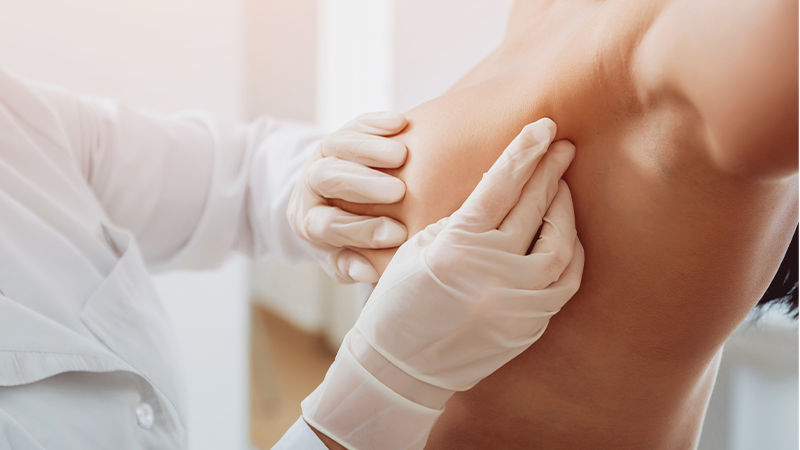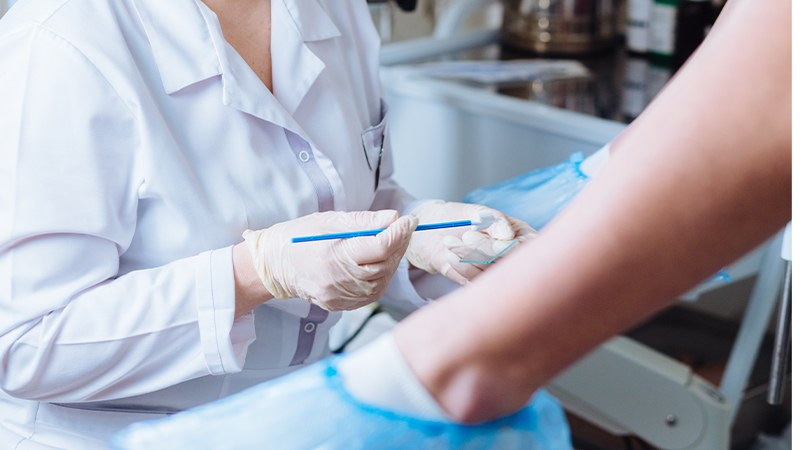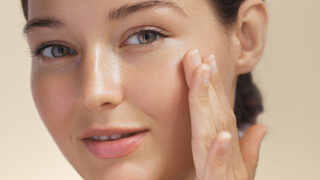From mindful eating habits to mammograms, vitamin D deficiency tests to Pap smears, here are five health checks that every woman can do to level up their health.
#1 Book a nutritional deficiency assessment health check
Many ladies are no strangers to suffering from bouts of mood swings, weight gain, chronic fatigue or even low libido. But before we chalk them up simply to hormones, ageing or ‘being a woman’, it might be to our benefit to first take a nutritional deficiency test.
DR SANKEERTH REDDY and DR TIFFANY YEO-REDDY are co-founders of health and wellness clinic Zest Clinic. They highlight the importance of regular nutritional deficiency health checks for women. In particular, for iron, ferritin (a blood protein that contains iron) and vitamin D deficiency. “Iron deficiency has a great implication for women. It can easily lead to low energy levels, tiredness, poor sleep, menstrual issues, hair loss, weight gain, low energy, low mood, skin and nail issues.” Similarly, vitamin D deficiency also leads to issues such as osteopenia or bone density loss, while also affecting a woman’s mood and metabolism.

“That’s why it’s so important to identify low iron and vitamin D deficiency. Only then can you accurately correct it,” says Dr Reddy. To do so, Dr Yeo-Reddy, who heads Zest Clinic’s women’s health services, recommends in-clinic blood tests and consultation. After this, doctors can propose the most suitable treatment plan, which may include iron supplements, IV iron infusion, vitamin D high-dose capsules or injections. Iron infusions can lead to significant improvements in energy levels, mood, anxiety levels, sports and exercise performance within weeks. Haemoglobin and ferritin levels take a few months to build up, while bone density enhancements may take several months to reflect on BMD scans.
Dr Reddy and Dr Yeo-Reddy recommend a health check at least annually to prevent iron and vitamin D deficiency (as well as low hemoglobin and bone mineral density in mature women). But that’s not all. We are what we eat, and an iron and protein-rich diet is key. “Vitamin D is rich in fatty fish like salmon and tuna, organ meats, mushrooms, eggs and dairy. Plus, avoid processed foods that could leach nutrients from your gut. A healthy lifestyle with adequate amounts of exercise and sunlight also allows our body to create its own vitamin D and prevent vitamin D deficiency.”
#2 Strive for a balanced diet
The likes of gluten-free diets, no-dairy products and meat-free alternatives have been all the rage in recent years, fawned over as ways to eat clean and keep weight under control. But are they effective for everyone? Not necessarily, according to gastroenterologist DR ANDREA RAJNAKOVA.

Take many women’s increasing aversion to gluten, for example. “For healthy people who do not have coeliac disease or gluten sensitivity, there is no scientific evidence that gluten-free living has any health benefits or that it is necessary to eliminate it from the diet. Gluten is a common component of many foods and grains. They contain important nutrients such as fibre, vitamins and minerals,” says Dr Rajnakova. “The misconception that bread and wheat foods cause weight gain comes from oversimplification and a misunderstanding of nutrition and how your body works. It is not true that bread is automatically unhealthy or that it makes you gain weight.”
She emphasises the importance of recognising negative aspects of cutting out specific food groups for non-medical reasons. Often, alternatives require substitutes that may contain more fat, sugar or other additives to improve taste and texture. This can lead to an unbalanced diet and increased calorie intake. Not to mention, they’re often more expensive and harder to find.
The healthier way forward? Strive for a balanced and colourful diet that provides the body with the necessary nutrients and energy. Dr Rajnakova suggests eating a variety of foods from different food groups in your diet. They include fruits, vegetables, whole grains, protein, dairy products and healthy fats. Avoid excessive intake of refined sugars and saturated fats, give preference to fresh and unprocessed foods, and watch your fluid intake. Yes, that includes alcohol and your favourite Coke Zero.
She adds, “It’s important to remember that healthy eating is a long-term commitment and requires balance, moderation and long-term consistency. It doesn’t work based on a single meal or a one-time strategy. Equally important is regular exercise and a healthy lifestyle.”
#3 Go for regular breast cancer screening
Breast cancer screening is among the most important health checks for women to prioritise, and there are many screening tools available.
Mammograms are the most widely used tool for breast cancer screening worldwide. And, with recent developments in the field, there’s now a newer type of mammogram available: 3D mammograms. Although more costly than 2D mammograms, 3D mammograms have a higher accuracy of detection for smaller cancers. They can be a particularly useful tool for patients who have a high risk of developing breast cancer, says DR TRISHA UPADHYAYA of Osler Health International.
Other diagnostic health checks such as breast magnetic resonance imaging (MRI) and ultrasounds may also be useful for women in detecting breast cancer, she says. “Breast MRI is often used in conjunction with mammograms for women who are at higher risk of getting breast cancer. Similarly, a breast ultrasound on its own is not very useful, but is often used in conjunction with mammogram if an abnormality has been found on a mammogram.”

Regardless of the method you choose for your health check, the key is early detection. Dr Trisha advises women aged 50 years and above to go for breast cancer screening every two years. She even recommends that women between the ages of 40 and 49 consider starting breast cancer screening.
“They should have a thorough discussion with their doctor, assessing their risk factors and the benefits and limitations of screening,” she says. “If women between the ages of 40 and 49 do decide to undergo breast cancer screening, then this is usually recommended to be performed annually.”
Some women may have certain risk factors that put them in a higher risk category of developing breast cancer. They include familial history, or known genetic or medical conditions that may predispose them to developing cancer. For these women, Dr Trisha says screening should start at an earlier age, after a detailed discussion with their doctor
#4 Do a monthly self health check
In addition to going for regular medical breast examinations, you’ll want to add monthly self health checks to your priority list, says breast surgeon DR GEORGETTE CHAN. Luckily, it’s an important health check that one can do right in your own home.
“This health check is very important. It allows us to detect even subtle changes – things like lumps, nipple retraction or skin dimpling,” she says. “Young women should ideally start doing this in their twenties to become familiar with how their own breasts feel. Seven to ten days after the start of your menses is the best time to do it, because that’s when the breasts are least sensitive.”

If you do find a lump during a self-exam, don’t panic – 90 percent of lumps detected are benign, says Dr Chan. “If you find one while you’re close to your menstrual period, it could be due to temporary hormonal changes. So, I suggest waiting until after your period to see if it’s still there. If it is, go to see your GP or a breast specialist,” she advises.
#5 Schedule a Pap smear
Cervical cancer screening is among the most important health checks for women. Also known as a cervical smear, a Pap smear test is a method of detecting abnormal cells on the cervix (the entrance to the uterus). It detects early pre-cancerous cells with the aim of preventing cervical cancer, explains DR HINA KADWANI of International Medical Clinic (IMC) Jelita.
“Cervical cancer can present with symptoms of pain or bleeding during intercourse or irregular vaginal bleeding in between periods. However, in some cases, there may be no symptoms. Therefore, it’s crucial for women to undergo regular Pap smears as part of their health checks.”
The health check can be easily done in a clinic consultation. It involves collecting a sample of cells from the cervix during a routine pelvic examination. First, an instrument called a speculum is inserted into the vagina, allowing for a clear view of the cervix. Once the speculum is inserted, a brush is used to take a sample of cells from the cervix. This may feel a little strange; however, it only takes a few minutes to complete and is not usually painful.

Dr Kadwani points out a concurrent test for Human Papilloma Virus (HPV) is routinely recommended. It can be done on the same sample of cervical cells already taken. The cells are then also checked for the presence of HPV.
“Multiple strains of HPV can affect different parts of the body, including the skin, mouth, throat and genitals. Certain HPV strains are deemed high risk and are linked to the development of abnormal cells, which can lead to cervical cancer,” she says. “Screening for the presence of HPV can help determine a patient’s risk for developing abnormal cell changes. Results for the HPV test will often report if you are positive for HPV and if you are positive for a high-risk strain.”
For normal results, Dr Kadwani says the patient’s HPV status (positive or negative) determines the interval period for repeat Pap smears. Your healthcare provider can make this decision with you.
For abnormal Pap smear results, she says management options depend on the extent of cell changes found. “Mild changes require observation initially, followed up by a repeat Pap smear at a shorter interval. Moderate to severe changes may require a gynaecology referral for further investigation and, in some instances, removal of the abnormal cells.”
Directory
Zest Clinic
#05-04/05 Parkway Parade Medical Centre, 80 Marine Parade Road
9176 9378 | zest.clinic
Andrea’s Digestive, Colon, Liver and Gallbladder Clinic
#21-11/12 Royal Square Novena, 101 Irrawaddy Road
6264 2836 | andrea-digestive-clinic.com
Dr Chan Consultancy
#11-09 Mount Elizabeth Medical Centre, 3 Mount Elizabeth
6386 5167 | georgettechan.com.sg
International Medical Clinic
IMC Camden, IMC Children’s, IMC Jelita and IMC Katong
6733 4440 | imc-healthcare.com
Osler Health International
#02-27/02-34 Raffles Hotel Arcade, 328 North Bridge Road
#B1-27 The Star Vista, 1 Vista Exchange Green
6332 2727 | osler-health.com
This article first appeared in the October 2023 edition of Expat Living. You can purchase the latest issue or subscribe so you never miss a copy!
To make the most of living in Singapore, read our latest City Guide here for free!




